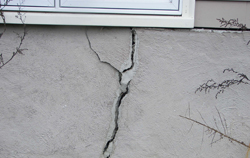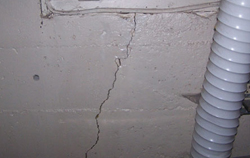

When a home is built on uneven or unstable soil, the walls and floors may crack, creating a need for wall crack repair. Walls also may crack because of excess moisture around the foundation causing too much pressure.
Whatever the cause of wall cracks, it is important to know that wall cracks usually signify a need for foundation repair. These types of repairs, ranging from underpinning to helical pier installation, should be trusted to the professionals at Tar Heel Foundation Solutions.
Here are some symptoms that you may want to examine your home for:
The least worrisome of wall cracks, cracks that occur when concrete cures are normal and usually cosmetic in nature. These are called “shrinkage cracks” and are usually no bigger than a hair in width. They are usually found near the center of the slab and don’t vary in width along the length of the crack.
Although these cracks are usually nothing to worry about, you shouldn’t ignore them. Monitor the crack to see if it is getting bigger, one end is wider than the other, or you can put a dime into the crack, you should call Tar Heel Foundation Solutions and schedule a free inspection.
The soil around your home or business can compress or shift, causing the foundation to settle unevenly. This settling can cause cracks to form. You may notice a vertical crack going up a wall. As the foundation moves, the cracks will usually widen either at the top or bottom of the gap.
These cracks need to be repaired as soon as possible. They will not get better or go away, in fact, they will only get worse as the building settles. Do not waste any time calling a professional to take a look at these kinds of cracks. Your home or business is in danger of serious structural damage or failure.
Most soil will expand and contract with the changes in moisture levels, but clay soil is the worst. If you have clay soil around your foundation, the pressure from the earth can cause foundations to bow, lean, or crack.
The pressure from expanding soil can reach thousands of pounds per square inch. If this is ignored, the wall will continue to be pushed out of place until it falls or collapses. At this point, the wall will need to be rebuilt and there may be serious structural issues that will also have to be repaired. A small problem is now a big, expensive problem. Let Tar Heel Foundation Solutions help your bowing or leaning wall before it falls into your basement.
If you notice any of these danger signals, call us today. We can help determine a solution for any foundation problems you may be experiencing.
No matter the cause of your wall cracks, Tar Heel Foundation Solutions has the tools and knowledge to keep your foundation strong, stable, and safe.
Foundation piers are a permanent solution for a building that is sinking or settling. The piers can be installed year-round and will stabilize and lift the foundation.
Also known as plate anchors, wall anchors are used for straightening out and strengthening bowing or leaning walls. Sometimes this solution is permanent, but it can be used as a temporary solution until the contractor can straighten the walls completely over time.
The professionals at Tar Heel Foundation Solutions are educated in identifying foundation wall cracks and the best solutions to repair them. Call today for a free estimate.


